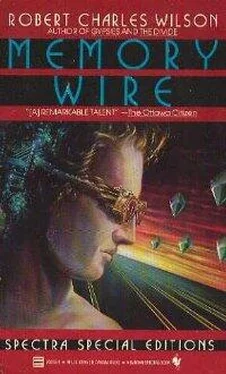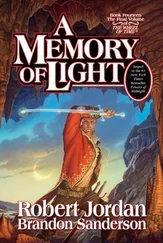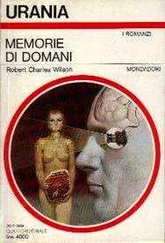Robert Wilson - Memory Wire
Здесь есть возможность читать онлайн «Robert Wilson - Memory Wire» весь текст электронной книги совершенно бесплатно (целиком полную версию без сокращений). В некоторых случаях можно слушать аудио, скачать через торрент в формате fb2 и присутствует краткое содержание. Год выпуска: 1987, ISBN: 1987, Издательство: Bantam Spectra, Жанр: Фантастика и фэнтези, на английском языке. Описание произведения, (предисловие) а так же отзывы посетителей доступны на портале библиотеки ЛибКат.
- Название:Memory Wire
- Автор:
- Издательство:Bantam Spectra
- Жанр:
- Год:1987
- ISBN:978-0-553-26853-9
- Рейтинг книги:4 / 5. Голосов: 1
-
Избранное:Добавить в избранное
- Отзывы:
-
Ваша оценка:
- 80
- 1
- 2
- 3
- 4
- 5
Memory Wire: краткое содержание, описание и аннотация
Предлагаем к чтению аннотацию, описание, краткое содержание или предисловие (зависит от того, что написал сам автор книги «Memory Wire»). Если вы не нашли необходимую информацию о книге — напишите в комментариях, мы постараемся отыскать её.
Memory Wire — читать онлайн бесплатно полную книгу (весь текст) целиком
Ниже представлен текст книги, разбитый по страницам. Система сохранения места последней прочитанной страницы, позволяет с удобством читать онлайн бесплатно книгу «Memory Wire», без необходимости каждый раз заново искать на чём Вы остановились. Поставьте закладку, и сможете в любой момент перейти на страницу, на которой закончили чтение.
Интервал:
Закладка:
“We have a name,” Oberg said.
“Oh?”
“The name is Ng.”
“I see,” Andreazza said, nodding.
They shared lunch at the military commissary. Oberg was anxious to get on with his work—prickling now with the urgency of it—but Andreazza forced him through the protocols of delay. And the food, of course, was dreadful.
“Oberg,” Andreazza said suddenly, “Stephen Oberg… did you know there was an Oberg here during the war?
Special Forces, I think. Razed some villages out west of Rio Branco. It was a scandal. Killed a lot of women and children:” He smiled. “So they say.”
“I wasn’t aware of that,” Oberg said coolly.
“Ah,” Andreazza said thoughtfully. “Yes.”
CHAPTER 10
Roberto Meirelles woke before sunrise on the day of the deal and knew there would be trouble. The question for him had become: to go through with it or not?
He slept on a platform bed in a shack in a valley below the old town of Pau Seco. It was a bad location. Most of the town’s sewage flowed past Meirelles’s shack in a muddy brown streamlet, down past the ugliest tin habitations and finally into the bush, which the waste matter had made verdant and lush. Everything Meirelles owned was in this shack. He owned two faded khaki T-shirts, two pairs of denim pants, a mattress, a photograph of his wife and child.
And the stone.
This morning—already nervous, but carefully not thinking of the day ahead—he took the oneirolith out from the place he had made for it, a slit in the mattress where he had removed some of the ticking, and regarded it gravely in the dim light of a battery lamp.
You, he thought. You could be my fortune or you could be my death.
He held the oneirolith carefully. Over time he had learned the nuances of the stone. Held gently in the open palm of his hand—as now—it created only the faintest tingle of strangeness, a gentle electricity that seemed to focus a physical sensation behind his eyes. If he clasped it tightly, it would begin to work in earnest. It would make visions; visions of places so impossibly distant Meirelles could not begin to make sense of them; or more often these days, visions of his home.
Meirelles understood that the oneirolith had come from another world, traveled somehow across an unimaginable gulf. And although he had marveled at that once, it no longer seemed strange or remarkable to him. It was a fact, and facts grow smooth with handling. What made the stone remarkable—and precious—to Meirelles was the way it unlocked these memories of his wife and child in Cubatao. With luck, he thought, it could carry him back there—a wealthy man.
He shook his head. Such dreams were premature. Worse, dangerous. He tucked the oneirolith back into the mattress and deferred his decision. As far as it was possible, he worked to make his mind blank.
Outside, the sky was beginning to lighten. Pots- and pans rattled, cocks crowed, bony scavenger dogs howled away the night. It was a morning, he told himself sternly, like any other.
He was what the others called a formiga, an ant, though he loathed the word himself. Meirelles was a proud man and resented being compared to an insect. Still—joining the surge of humanity down into the overheated canyon of the oneirolith mine, the sun like a blade against the back of his neck—he supposed the comparison was inevitable.
He wore huge canvas bags strapped to his shoulders and waist. The work and the diet of protein stews served in the labor compounds had made him thin but strong. Meirelles was thirty-five years old, and not a young thirty-five, but he had become proud of his body. He had survived the outbreak of Oropouche Virus that had swept Pau Seco a year ago. His body was wiry now—and far healthier, he knew, than it would have been had he stayed in Cubatao.
But the thought was not a pleasant one, and he suppressed it. (His wife and child were still in Cubatao.)
He climbed down the wooden ladders and followed a switchback trail steeply downhill; then rope ladders and another narrow trail to the bottom of this vast open pit. The temperature here was a good ten degrees warmer than at the top, and he had tied a rag around his head to soak up the sweat. Here men were already laboring, garimpeiros watching with clipboards from canvas tents or joining in with shovels and picks. The primitiveness of it did not impress him: the factories of the Mogi River Valley had been primitive too.
He set about his work as he did every day. It was impossible to ignore, however, the obvious fact that this was not a day like every day. The military police stood in stern phalanxes at the high wire fences that surrounded the mine. Everyone who passed in or out was being frisked. And there were soldiers down here, too, for the first time in Meirelles’s memory, moving among the garimpeiros and asking questions.
If I had any sense, Meirelles scolded himself, I would leave the stone in the mattress and forget about it, just forget about it. If I had any sense.
Meirelles worked for a man named Claudio, a city man reputed to be a nephew of the Valverde family, a rich man who had taken many valuable stones out of the soil already. Claudio enhanced his profit by hiring workers out of the hopeful masses who thronged the old town, giving them false certification cards and then threatening to expose them to the military police. Meirelles himself was such a person. He earned very little at his work, and what he did earn he sent immediately back to his family in Cubatao; he could eat for free—with his false certification card—in the workers’ compounds, and he did not pay rent on his shack.
It was a stem but equitable enough arrangement, Meirelles thought at first: and if Claudio uncovered a valuable oneirolith from the mud, then Meirelles would take his small share and move himself and his family out of the toxic Mogi River Valley. All he wanted was money enough to make a new life.
Time passed, however, and many stones were uncovered, and Meirelles never saw more money than his weekly pittance. One time he screwed up his courage and confronted Claudio in his big tent above the mine, and Claudio appeased him and promised that things would be different in the future. The next day one of Claudio’s hired men, a thug, blackened Meirelles’s right eye and told him to be grateful for what he had. He had a work permit, didn’t he? Well, it could be taken away. He could be turned over to the military police. He should remember that.
He did. He remembered it one day when he drove his shovel into the elastic clay and felt it rebound from something solid there.
The day had nearly ended. Already long shadows were gathering here in the deepest part of the mine. Workers were collecting their tools and readying themselves for the long trek up to the compounds, warm food, a dash through the shower stalls. Feeling suddenly feverish, Meirelles put his hand down into the wet clay and grasped the object he had uncovered. Still bending low, scrubbing the dirt from it, he saw the deep azure glint of the oneirolith’s surface. It was a large and perfect stone, undeniably very valuable. He trembled, holding it.
Later he could not say why he chose to steal it. Thievery was difficult and dangerous, and there was no ready market a man like Meirelles could count on. It was undoubtedly an irrational act. Still, he thought of Claudio’s bland reassurances and of the man who had blackened his eye. He thought of his wife and child, his daughter Pia coughing in the ugly yellow air of his hometown. A day in the deep angles and convolutes of the oneirolith mine sometimes induced in Meirelles a kind of abstracted dreaminess, as if the alien artifacts beneath the soil were working a subtle influence on him, making the past more real and the present less urgent. And so, with Claudio and his daughter Pia on his mind, dreaming, he thumbed away the excess clay from the oneirolith and used his cotton leggings to wrap the stone and bind it to his ankle. When he stood up, the long hem of his denim pants obscured the bulge.
Читать дальшеИнтервал:
Закладка:
Похожие книги на «Memory Wire»
Представляем Вашему вниманию похожие книги на «Memory Wire» списком для выбора. Мы отобрали схожую по названию и смыслу литературу в надежде предоставить читателям больше вариантов отыскать новые, интересные, ещё непрочитанные произведения.
Обсуждение, отзывы о книге «Memory Wire» и просто собственные мнения читателей. Оставьте ваши комментарии, напишите, что Вы думаете о произведении, его смысле или главных героях. Укажите что конкретно понравилось, а что нет, и почему Вы так считаете.












